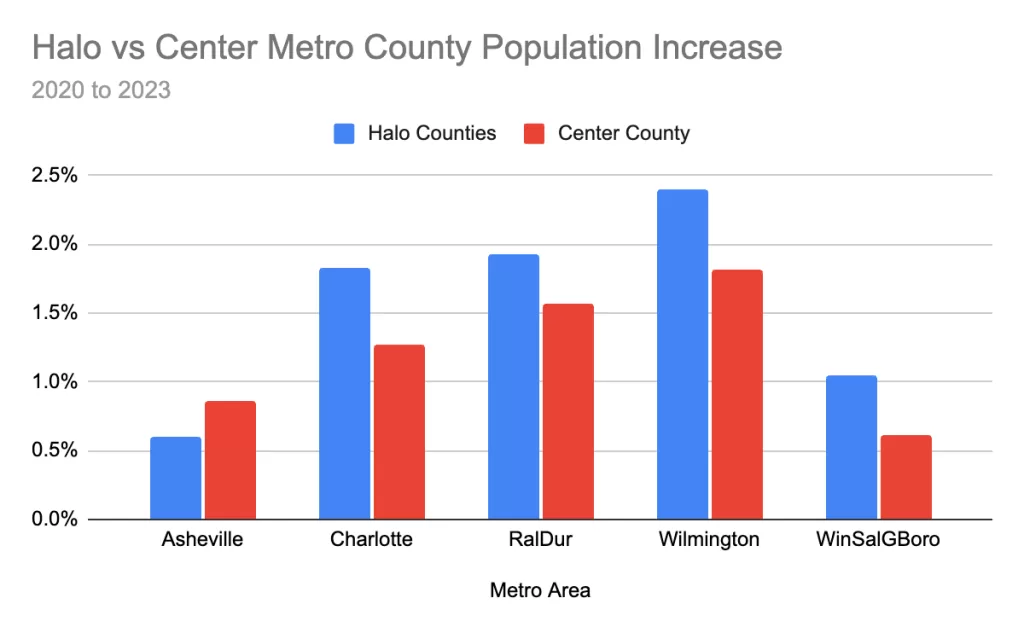As I was writing Top Suburban Markets in North Carolina for Neighborhood Shopping Center Investments, I saw a way to use that data to further confirm what the news has been saying: that people are migrating to North Carolina, and that they are moving to the suburbs. We’ve been calling these areas around the urban centers halo areas, and we look for real estate investments there.
Halo communities are where people who support the city live. It’s where they sleep at night, order pizza on Friday, and do their weekly grocery shopping. In general, they are steady and stable areas where housing and retail investments have low down-side risk, steady income, and can still offer high up-side potential.
Using the county-based data from the NC Office of State Budget and Management, I identified the main metro areas, the counties in the center of each, and the halo counties around each. Halo counties were roughly based on drive-time, not on strict adjacency.
| Metro Area | Center County | Halo Counties |
|---|---|---|
| Asheville | Buncombe | Haywood, Henderson, McDowell, Madison, Polk, Rutherford, Transylvania, Yancey |
| Charlotte | Mecklenburg | Alexander, Anson, Cabarrus, Catawba, Gaston, Iredell, Lincoln, Rowan, Stanly, Union |
| Raleigh-Durham | Durham, Wake | Chatham, Franklin, Granville, Harnett, Johnston, Lee, Nash, Orange, Person |
| Wilmington | New Hanover | Bladen, Brunswick, Columbus, Onslow, Pender, Avery |
| Winston-Salem / Greensboro | Forsyth, Guilford | Alamance, Alleghany, Caswell, Davidson, Davie, Rockingham, Stokes, Surry, Yadkin |
Then I calculated the average annual population increase over the years 2020-2030.
| Metro Area | Center County | Halo Counties |
|---|---|---|
| Asheville | 0.9% | 0.6% |
| Charlotte | 1.3% | 1.8% |
| Raleigh-Durham | 1.6% | 1.9% |
| Wilmington | 1.8% | 2.4% |
| Winston-Salem / Greensboro | 0.6% | 1.1% |
And here is the same data in a chart:

Of course, the halo counties are much larger in terms of area, so the population increase is spread over a larger area. But increased population still results in increased demand for housing and shopping. And this data confirms our targets of housing and neighborhood shopping centers in the halo communities in North Carolina.

Doug Kline, PhD, has held income properties in North Carolina for more than 20 years. He holds a North Carolina broker’s license, and is a member of the National Association of Realtors and the Triangle Real Estate Investors Association. He holds an MBA and a PhD in business. In addition to his real estate activities, Doug enjoyed a successful career in academia, achieving the rank of Full Professor in the Cameron School of Business at UNC Wilmington. He was honored with research and teaching awards, served as Director of the MS Computer Science and Information Systems program, and was awarded the endowed position Distinguished Professor of Information Systems.
